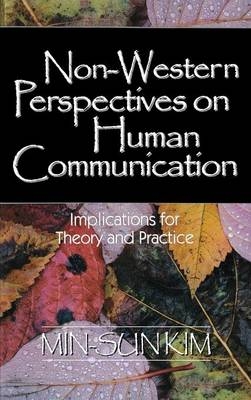
Non-Western Perspectives on Human Communication
SAGE Publications Inc (Verlag)
978-0-7619-2350-3 (ISBN)
What it means to be a self - and a self communicating and being in a particular culture - are key issues interwoven throughout Min-Sun Kim′s impressive text, Non-Western Perspectives on Human Communication. Going beyond cultural descriptions or instructions on adapting to specific cultures, the author interrogates the very core assumptions underlying the study of human communication and challenges longstanding individualistic, Western models on which much intercultural research is based. Kim proposes a non-western way of conceptualizing identity, or the "self" - the cornerstone of cultural research -- illuminating how traditional western and non-western views can be blended into a broader, more realistic understanding of cultures and communication. Grounding her work in a thorough knowledge of the literature, she challenges students and researchers alike to reexamine their approach to intercultural study.
Features:
Interrogates embedded assumptions about the traditional [Western] study of human communication with stunning, thought-provoking insight
Illuminates issues surrounding culture and identity formation and challenges the reader to examine not only the study of human communication, but its engagement in everyday life
Informs complex academic theory with stellar writing, poignant examples, and careful analysis
Invites scholars and students to explore and integrate a long overdue multicultural perspective on human communication.
About the Author:
Min-Sun Kim (Ph.D., Michigan State University) is Professor in the Department of Speech at the University of Hawaii at Manoa. Her research focus is the role of cognition in conversational styles among people of different cultural orientations. She is currently serving as an Associate Editor for Communication Reports and also as a reviewer for various communication journals.
Min-Sun Kim (Ph.D., Michigan State University, 1992) is Professor in the Department of Speech at the University of Hawaii at Manoa. Her research focuses on the role of cognition in conversational styles among people of different cultural orientations. She has applied her models (based on conversational constraints) in the areas of requesting, re-requesting, conflict styles, communication motivation, etc. She has conducted extensive research in this and related areas and has published more than 40 research papers in major communication journals, plus several more papers which are in press. Her two newest theoretical developments, focusing on relativity of communication constructs, appeared in two consecutive volumes of Communication Yearbook (Vol. 22 and Vol. 23) . She is the recipient of numerous top paper awards in major international communication conferences, and was recently invited to give a keynote speech on Paradigms of Cultural Identity at the 3rd annual conference of the David C. Lam Institute for East-West Studies, Hong Kong. She has served as a Division Secretary for the International and Intercultural Communication Division of the International Communication Association. Since 1994, the author has also served as a workshop leader for the annual Summer Workshop for the Development of Intercultural Coursework at Colleges and Universities (which is run by the Center for International Business Education and Research at the University of Hawaii at Manoa). She is currently serving as an Associate Editor for Communication Reports and also as a reviewer for various communication journals.
I. INTRODUCTION
1. "Who am I?": Cultural Variations in Self-Systems
Evolution of Western Self-Construction: "America′s Civil Religion"
Interdependent Self-Construals-An Alternative Framework
2. Independent and Interdependent Models of the Self as Cultural Frame
3. Why Self-Construals are Useful
Parismony of Explanation: Impact of Culture
Cultural Relativity of Communication Theories
ii. CULTURAL RELATIVITY OF COMMINCATION CONSTRUCTS AND THEORIES: "U.S.- CENTRISM"
4. "Communication Apprehension": "Deficiency" or "Politeness"?
Motivation to "Avoid" Verbal Communication
Traditional View: Communication "Avoidance" as a Deficiency
Communication Avoidance Stemming from a Sensitivity to Social Contexts
Implications
5. Motivation to "Approach" Verbal Communication: Is Communication Approach Always Healthy?
Assertiveness: "Standing up for your own Rights"
Argumentativeness: A Subset of Assertiveness
Critique and Summary
6. Conflict Management Styles: Is Avoidance Really a "Lose-Lose"?
Prior Conflict Management Typologies
Individualistic Bias in Past Conceptualizations of Conflict Styles
7. Cognitive Consistency: A Cultural Assumption?
Fundamental Assumptions of Cognitive Dissonance Theory
Is Cognitive Dissonance a Culture-Bound Concept?
8. Attitude-Behavior Consistency: Cultural Ideal of the Individualistic Society
Predicting Behaviors: Deemphasizing Situations Over Attitudes
Emphasizing Other Sources of Behavior
9. Susceptibility to Social Influence: Conformity or "Tact"?
An Eco-Cultural Explanation of Conformity
Conformity as "Social Sensitivity," Independence as "Insensitivity"
10. Internal Control Ideology and Communication: Are Internals "Good Guys" and Externals "Bad Guys"?
Internal Control Ideology
Relationship between Locus of Control and Communication Ideology
11. Deceptive Communication: Moral Choice or Social Necessity?
Deception as a Moral Issue: Independent Perspective
Deception as a Social Necessity: Interdependent Perspective
12. Self-Disclosure: Bragging vs. Negative Self-Disclosure
Motivational Influences on Styles of Self-Disclosure
13. Silence: "Is It Really Golden?"
Silence as Malfunctioning of (Human) Machines
Neglected Component of Human Communication: Silence
14. Acculturative Communication Competence: Who Bears the Burden of Adjustment?
Assimilation Model: "Marginal Man [sic]" Perspective
Alternation Model: Bicultural Perspective
Host Communication Competence: One-Way Assimilation
Bicultural Communication Competence: Alternation Model
III. TOWARDS A BI-DIMENSIONAL MODEL OF CULTURAL IDENTITY
15. The Sources of Dualism: Mechanistic Cartesian Worldview
Bias Toward "Yang" Communication Behaviors
Particle/Wave Paradox: Implications of Personhood for Human Communication
16. Dimensionality of Cultural Identity
Unidimensional Model of Self-Construals
Bi-dimensional Model of Self-Construals
Support for the Bi-dimensional Model
Formation of Bicultural Identity
IV. CONCLUSION-TOWARDS MODELS OF MATURITY
17. Into the Future: Implications for Future Inquiry
Postscript
References
| Erscheint lt. Verlag | 18.9.2002 |
|---|---|
| Verlagsort | Thousand Oaks |
| Sprache | englisch |
| Maße | 152 x 228 mm |
| Gewicht | 450 g |
| Themenwelt | Sozialwissenschaften ► Kommunikation / Medien ► Kommunikationswissenschaft |
| ISBN-10 | 0-7619-2350-0 / 0761923500 |
| ISBN-13 | 978-0-7619-2350-3 / 9780761923503 |
| Zustand | Neuware |
| Haben Sie eine Frage zum Produkt? |
aus dem Bereich


